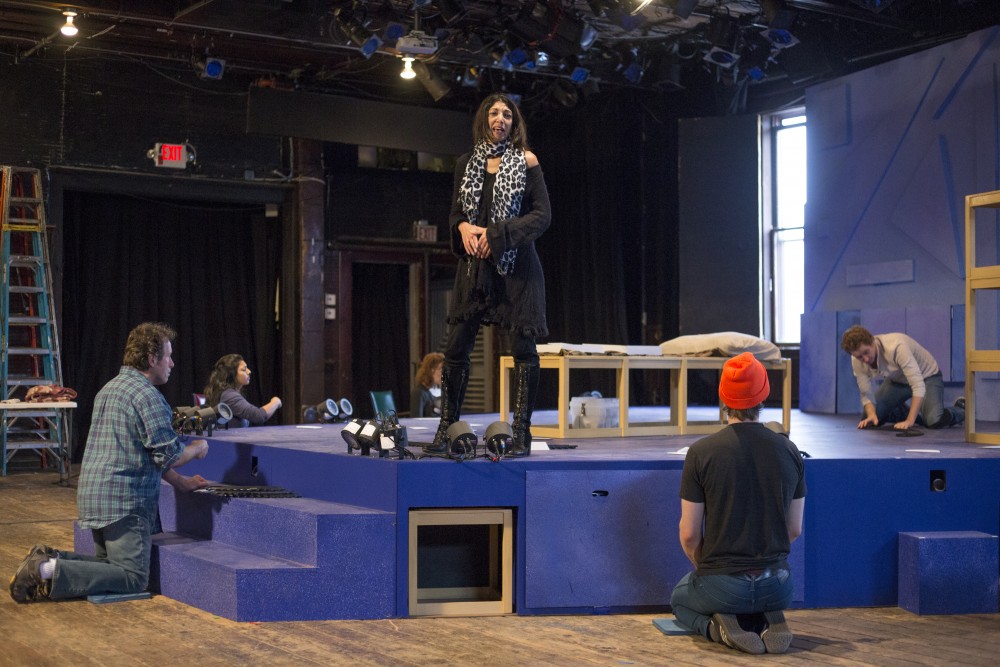Mixed Blood Theatre’s upcoming production of “The Curious Incident of the Dog in the Night-Time” will be the fifth Mixed Blood-produced play that focuses on autism in the last 10 years. Jack Reuler, director of production and artistic director of Mixed Blood, has followed the script since its West End and Broadway runs, hoping to bring it to his company.
“It was a journey to get it from being made into a play to making it to our stage,” Reuler said. “But it’s something that we thought for a long time would be something that we could do well and something that should be done well in the Twin Cities.”

The play follows Christopher, a 15-year-old boy with autism, as he tries to solve the mystery of his neighbor’s dead dog and falls down a rabbit hole of discoveries. Based on a 2003 novel by Mark Haddon, the play deviates slightly from the novel’s first-person narration from Christopher.
In the staged version, the play is narrated by Christopher’s mentor Siobhan, who reads from a play that was developed from Christopher’s discoveries and adventures.
“I loved [Siobhan] because I have a social work background,” said Regan Linton, the actress playing Siobhan. “I went from being an actor … then I was injured and I was in college and did American studies. Then I made my way back to theater and got my master’s in social work, and then got my MFA in acting.”
In preparing for the role, Linton drew from her experiences in social work and as a disabled actor.
“Social work is the best training you can get to be an actor because it’s all about empathy,” Linton said. “It’s all about putting yourself in someone else’s shoes… I identify with [Siobhan] because I think my experience of acquiring a disability has forced me to see the world differently than when I was able-bodied, and I think she is similarly drawn to Christopher… because she enjoys the way he sees the world.”
MacGregor Arney, the actor playing Christopher, also used personal experience to prepare for the demanding role.
“I have three cousins… with varying degrees of autism,” Arney said. “So growing up, I had a huge variety of autism to observe and to actually be intrigued with… Going from my experiences with my life and my family, and then coming into this role, that’s mainly how I prepared: by focusing on what they do and how they approach things.”

Arney’s work for the role involves physical and vocal training, alongside the traditional analytical work that goes into a role.
“I would say the physicality is the most difficult part, but I think it’s actually more so getting the affect of the voice and getting those intentions. He says everything directly, so you have to know what he wants, but how does he want it? You can’t really have the emotions outwardly,” Arney said.
The production team is careful to not over-generalize the autism spectrum. Mixed Blood’s interpretation instead focuses on the depiction of one individual with autism, supported by work with the Fraser Center and a counselor from Southwest High School.
“The first couple of days, we had kind of autism immersion. We had an adolescent psychologist who focuses on autism and is also a parent of a child with autism, spend some time with us… and then we [talked with] someone from Southwest High School, who is… really very much in the same position as Siobhan,” Reuler said. “It’s an oft-cited phrase that if you’ve met one person with autism, you’ve met one person with autism. We aren’t trying, in Christopher, to embody the entire spectrum.”
While the national productions of “The Curious Incident” involved technical extravaganzas, Mixed Blood’s production relies on a simple scene setting to build the world Christopher navigates.
“There’s an ensemble of five actors that sits in the front row, and they jump onstage and become people and… they’ve got bins of props and costumes that… they put on for a second or hold up for a second to define the spaces,” Reuler said. “It’s actually got eight cubes, in the oldest theatrical traditions, and so [seeing] how those eight cubes turn into living rooms and police stations has been fascinating.”
Through these choices, the production hopes to let the audience see through Christopher’s lens rather than simply watch him move through the world.
“For me, it is this idea that ‘disability’ is just one human characteristic. It doesn’t completely define who somebody is as a human being,” Linton said.














